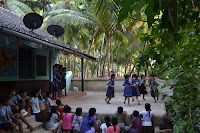We need volunteers !
We are proud to inform you that we have added another location to the buDa Folklore Map. We are setting foot in Angadibail ,Ankola! In addition to our existing centre at Honnavar, the new one at Ankola will offer students and researchers a wider perspective on folk culture, environment and sustainable development.
While we are in the process of making the Folklore Research and Study centre at Angadi bail functional by June 2012, we would like to have volunteers to help us set-up our new unit.
Location
buDa folklore have come out with a new set up @Angadibail 40km from Ankola town spread over in 16 acres of fertile land and surrounded by western Ghats and picturesque of hills.
Water is abundant in the form of streams and natural fountains
1. Green architecture and design - Starts in the month of May
Existing building requires modification in way that reflects Sustainable architecture with traditional construction methods under the lens of environmental consciousness Infrastructure Building. In the area of engineering, design and architecture - We are looking for enthusiasts, specialists and professionals who can design: an art & interaction space community kitchen and utility space , rooms / dormitories for visiting students, artisans and facilitators. and eco-friendly toilets and bathrooms.,
We want volunteers who are open to brainstorm ideas, draw-up a blueprint and guide the local folk in implementation of the plan and construction. For the construction, we would like to use locally available material to ensure it is sustainable, conducive for the local environment and cost effective.
Volunteers will be provided,
• Simple food and basic accommodation during the stay.
• Support of the locals in the construction activity
• Construction material
2. Livelihood programme – Starts in the month of May
It is the season for kokum fruit and the local villager’s largely ignore the value of this fruit .They dry the fruit in an unhygienic way any sell in the local market for throw away prices They are not equipped with modern processing methods to preserve the juice and bottling techniques
The seeds were used to make kokum butter which has great medicinal value and we lost this tradition.
 In the area of sustainable development, engineering and food science we are looking for enthusiasts, and specialists who can help us preserve the Kokum fruit that is available in plenty in this part of the Western Ghats.
In the area of sustainable development, engineering and food science we are looking for enthusiasts, and specialists who can help us preserve the Kokum fruit that is available in plenty in this part of the Western Ghats.
Kokum is used to make a local delicacy called solkadi and is also used to make a great cooling health drink - Kokum juice/Sherbet. These delicacies can be made round the year provided the fruit is dried and preserved in the summer months. We would like volunteers to teach and demonstrate to the local village women - hygienic, simple and cost effective ways to dry and preserve this fruit. In the long run, this could also provide an alternate means of livelihood for the village folk.
Volunteers will be provided,
Volunteers will be provided,
• Simple food and basic accommodation during the stay.
• Support of the locals in the food processing activity
• Materials required in building a simple drying unit.
The above-mentioned project – “Preserving the kokum fruit” is an urgent requirement. We would like to initiate this project as soon as possible as the fruiting season slows down by end of May.
3. Research and Documentation of the Kare okkalu community.

We are documenting the culture and folklore of kare-okkalu community who live in this belt. Individuals who know both Kannada and English and passionate about indigenous culture may apply. Individuals with a prior fieldwork experience will have an added advantage.
Volunteers will be provided
· Simple food and basic accommodation during the stay.
· Local travelling allowance
4. Upcoming programmes and projects:
We also need volunteers for upcoming programmes such as
-To run community based study tour programmes mainly for schools and gap year students. The volunteers’ roles have included designing and anchoring study programs for the students and various workshops for the community.
Experience sharing
In addition to work, the volunteer will also be expected to produce an article, drawings or photo essay about an aspect of their experience and learning. This is for publication on buda website ,our blogs and publications
Please note that volunteers will have to make their travel arrangements to Ankola. Ankola is very well connected by KSRTC and private buses from Bangalore.
Individuals, who are interested in volunteering for either of the above programs, please contact us folkloreindia@gmail.com
How to reach there
In the Google map search for buD folklore or click the following URL link
The facility
At present, there is a small outhouse with two rooms; one room is being used as kitchen. There is a siddi family looking after the place. They will cook for us and we need to provide the rations.






.JPG)






















